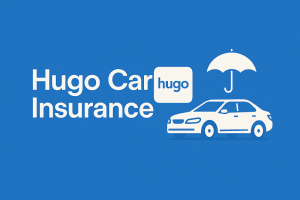Introduction to Hugo Insurance and Traditional Car Insurance
The world of car insurance is evolving, with new companies like Hugo Insurance entering the market and challenging the established traditional car insurance providers. For decades, traditional car insurance has been the go-to option for drivers who want to protect their vehicles and comply with legal requirements. But innovative platforms like Hugo offer alternatives that aim to make insurance simpler and more flexible. Choosing between Hugo Insurance and traditional car insurance depends on your personal needs, budget, and driving habits. Understanding the differences can help you make an informed decision.
How Hugo Insurance Works
Hugo Insurance operates as a pay-as-you-go model, providing drivers with the flexibility to purchase coverage by the day, week, or mile. Unlike traditional car insurance, where customers commit to lengthy policies, Hugo offers “on-demand” insurance that can be activated and deactivated as needed. This unique model is particularly beneficial for drivers who don’t use their vehicles frequently.
The process of getting Hugo Insurance is straightforward and digital-first. Customers simply sign up online, input their vehicle and driving information, and choose a coverage plan suited to their needs. The ability to pause and restart policies at will makes Hugo an appealing option for part-time drivers or those looking to save on insurance costs without sacrificing legal coverage.
The Functionality of Traditional Car Insurance
Traditional car insurance, on the other hand, functions on a long-term basis. Policies are typically sold on a six-month or annual schedule, requiring drivers to pay a fixed premium regardless of how often they drive. Traditional insurers calculate premiums based on multiple factors, including your driving history, age, location, and the type of car you own.
The payment structure for traditional car insurance often includes monthly or annual billing cycles. While not as flexible as Hugo’s pay-as-you-go system, traditional insurance provides a more predictable cost structure, making it easier to budget for. Additionally, traditional policies are well-suited for individuals who drive frequently and need continuous insurance coverage.
Cost Comparison: Hugo Insurance vs. Traditional Car Insurance
One of the biggest factors when comparing Hugo Insurance and traditional car insurance is cost. Hugo’s pay-as-you-go approach means you only pay for insurance when you’re actively using your car. This can result in significant savings for drivers who don’t use their vehicles daily. For instance, if you only need insurance for occasional errands or weekend trips, Hugo may help you cut down on unnecessary expenses.
Traditional car insurance, however, may be more cost-effective for individuals who drive regularly. Since traditional policies come with a fixed premium, frequent drivers tend to get better value per mile compared to pay-as-you-go plans. Additionally, traditional insurers often provide discounts for bundling policies, maintaining a clean driving record, or opting for paperless billing.
Your ultimate choice will depend on how often you drive and how much flexibility you need in your payments.
Coverage Options: Hugo Insurance vs. Traditional Car Insurance
Coverage is another critical element to consider when choosing between Hugo and traditional car insurance. Hugo Insurance generally offers the most basic forms of coverage required by law, such as liability insurance. This ensures drivers meet state requirements while keeping premiums low.
Traditional car insurance, however, often provides a broader range of coverage options. These may include comprehensive and collision insurance, uninsured motorist coverage, roadside assistance, and rental car reimbursement. If full protection is a priority for you—whether to guard against accidents, theft, or natural disasters—traditional insurance is likely the better choice.
That said, Hugo is a smart option for drivers who don’t need full-coverage insurance. For example, owners of older cars that aren’t worth much might not require comprehensive or collision coverage, making Hugo a practical and affordable solution.
Eligibility and Enrollment
When it comes to eligibility and enrollment, both Hugo Insurance and traditional car insurance have distinct processes. Hugo Insurance simplifies enrollment with its online-first approach. Drivers can typically sign up within minutes using their smartphone or computer—no paperwork or in-person visits required. This modern process is particularly appealing to tech-savvy individuals seeking a hassle-free way to get insured.
Traditional car insurance, while also increasingly adapting to digital tools, often requires additional steps for enrollment. Some providers may mandate in-person visits to local offices, phone interviews, or extended underwriting processes to finalize a policy. However, this more rigorous process also ensures that coverage is meticulously tailored to the customer’s unique driving habits and needs.
Customer Service and Claims
Customer service and claims handling are distinguishing features of both insurance models. Hugo prides itself on offering quick, responsive support through its digital platform. The ability to manage policies, ask questions, and even file claims entirely online is a major advantage for customers seeking efficiency and simplicity.
Traditional car insurance providers often have the resources to offer a more comprehensive customer service experience. With dedicated claims representatives, telephone hotlines, and local offices, traditional insurers can handle complex claims more thoroughly. Additionally, many traditional companies have decades of experience in managing diverse customer needs, which provides added peace of mind for policyholders.
Choosing between the two depends on what kind of service you value most—speed and convenience or detailed, personalized support.
Making an Informed Decision
Ultimately, the choice between Hugo Insurance and traditional car insurance depends entirely on your driving habits, priorities, and budget. Hugo’s pay-as-you-go model is ideal for infrequent drivers who value flexibility and cost savings. However, for those who drive daily or prefer comprehensive coverage with robust customer service, traditional car insurance may be the better choice.
Take the time to assess your unique needs and weigh the benefits of each option. Whether you’re drawn to Hugo’s innovative approach or the reliability of traditional insurance, being informed ensures you’ll make a decision that best suits your lifestyle.



